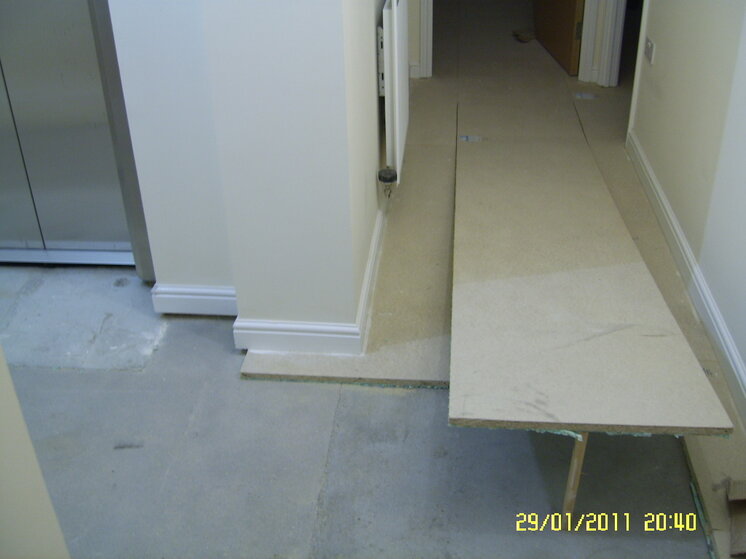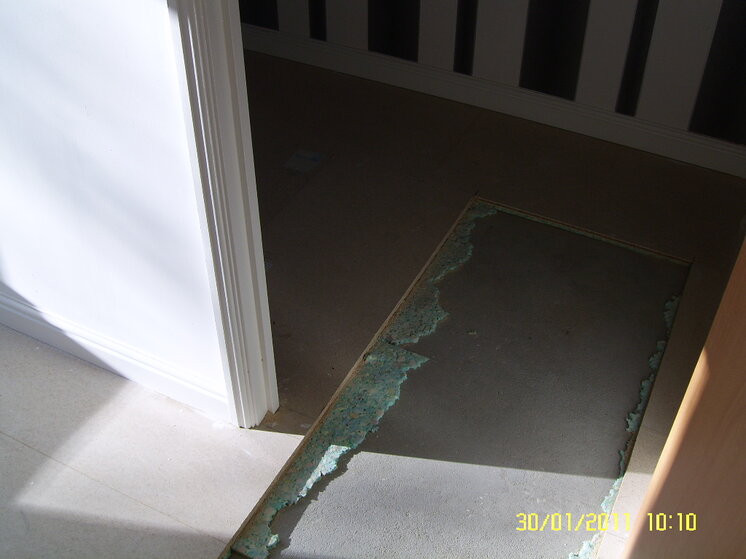I
Iwona
I know it's long but please could anyone advise?
I'm currently experiencing
a problem with my floor in the hallway area that was tiled approx. 8 months
ago.
In Dec last year I bought a brand new apartment. It did not have flooring
fitted by the building company. At the time of completion it only had
soundproofing system (chipboad and layer of foam) fitted directly on
concrete. Three weeks after completion, the apartment suffered from a
serious water leak due to incorrect instalation of boiler. Water got into
all rooms apart from kitchen and living room as well as to the rest of the
building. The building company came back to repair the damage. Two dehumidifiers were put
in for two weeks. The chipboard from the subfloor was only partially
replaced. As the whole sub-floor construction got uneven due
to patchy replacement, the builders screwed the newly installed chipboard
down to concrete in places. I was assured that the problem was resolved and
could carry on with my home projects. As a precoution I still waited over a
month to let the subfloor to rest before I hired a tiler to fit quartz
tiles in the hallway and kitchen. He continued screwing the chipboard down
to even the preassure - note the builders screwed it down in random places.
Then he primed the subfoor, used a self-leveling compound on top of it and
proceeded with layer of adhesive to glue the tiles. The same techinque was
used in kitched that has not been affected by the leak in any way and in the
hallway that unfortunatley suffered from the leak most.
Now 8 months later the floor in the hallway is a nightmare. It's very
uneven, some tiles are debonded, loose and move, grout cracked in all
joints, whilst the kitchen is as perfect as it was at the begining - nice,
even,etc - could not complain. When I got back to the builders saying that
the water damage few months ago causes me further problems, they concluded
that the fault is with the tiler as he had not used a ditra mat or plastic
ply. On the other hand the tiler claims, that the fault must with the
building company as they had not used a waterproof membrane on concrete
before applying the chipboard. He also points out that the technique should
not be challenged since the same one was used in the kitchen and worked
perfectly. :mad2::mad2::mad2:
Please could you advise if Ditra mat or plastic ply used on top of the
chipboard would prevent the damage?
I would grately appreciate your advice.I've got some pics so can post it if you need to get a clearer idea.
I'm currently experiencing
a problem with my floor in the hallway area that was tiled approx. 8 months
ago.
In Dec last year I bought a brand new apartment. It did not have flooring
fitted by the building company. At the time of completion it only had
soundproofing system (chipboad and layer of foam) fitted directly on
concrete. Three weeks after completion, the apartment suffered from a
serious water leak due to incorrect instalation of boiler. Water got into
all rooms apart from kitchen and living room as well as to the rest of the
building. The building company came back to repair the damage. Two dehumidifiers were put
in for two weeks. The chipboard from the subfloor was only partially
replaced. As the whole sub-floor construction got uneven due
to patchy replacement, the builders screwed the newly installed chipboard
down to concrete in places. I was assured that the problem was resolved and
could carry on with my home projects. As a precoution I still waited over a
month to let the subfloor to rest before I hired a tiler to fit quartz
tiles in the hallway and kitchen. He continued screwing the chipboard down
to even the preassure - note the builders screwed it down in random places.
Then he primed the subfoor, used a self-leveling compound on top of it and
proceeded with layer of adhesive to glue the tiles. The same techinque was
used in kitched that has not been affected by the leak in any way and in the
hallway that unfortunatley suffered from the leak most.
Now 8 months later the floor in the hallway is a nightmare. It's very
uneven, some tiles are debonded, loose and move, grout cracked in all
joints, whilst the kitchen is as perfect as it was at the begining - nice,
even,etc - could not complain. When I got back to the builders saying that
the water damage few months ago causes me further problems, they concluded
that the fault is with the tiler as he had not used a ditra mat or plastic
ply. On the other hand the tiler claims, that the fault must with the
building company as they had not used a waterproof membrane on concrete
before applying the chipboard. He also points out that the technique should
not be challenged since the same one was used in the kitchen and worked
perfectly. :mad2::mad2::mad2:
Please could you advise if Ditra mat or plastic ply used on top of the
chipboard would prevent the damage?
I would grately appreciate your advice.I've got some pics so can post it if you need to get a clearer idea.


